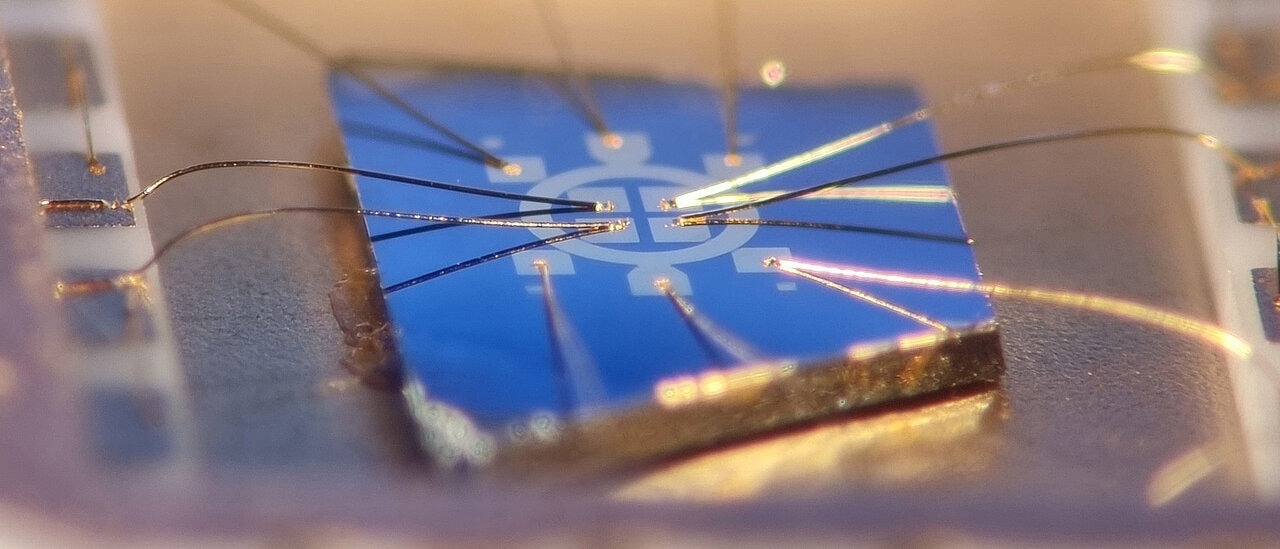
Until now, the zero magnetic field Quantum Anomalous Hall effect only occurred at very low currents. This device can change that. Image Credit: Kajetan Fijalkowski /JMU
Precise measurement of electrical resistance is crucial in various fields, including industrial production and electronics, particularly in manufacturing high-tech sensors, microchips, and flight controls.
Very precise measurements are essential here, as even the smallest deviations can significantly affect these complex systems. With our new measurement method, we can significantly improve the accuracy of resistance measurements, without any external magnetic field, using the Quantum Anomalous Hall Effect (QAHE).
Charles Gould, Professor, Institute for Topological Insulators, University of Würzburg
How the New Method Works
Many may recall the classic Hall effect from physics classes: a voltage arises—known as the Hall voltage—when a conductor with an electric current is exposed to a magnetic field. The resulting Hall resistance, calculated by dividing this voltage by the current, increases with the magnetic field's strength.
In thin materials and under strong magnetic fields, this resistance begins to develop into discrete steps, precisely defined as h/ne², where 'h' is Planck’s constant, 'e' is the elementary charge, and 'n' is an integer. This phenomenon is termed the Quantum Hall Effect, as the resistance values depend solely on these fundamental constants (h and e), making it an ideal standard for measuring resistance.
The QAHE distinguishes itself by allowing the quantum Hall effect to occur in the absence of a magnetic field.
Gould added, “The operation in the absence of any external magnetic field not only simplifies the experiment but also gives an advantage when it comes to determining another physical quantity: the kilogram. To define a kilogram, one has to measure the electrical resistance and the voltage at the same time but measuring the voltage only works without a magnetic field, so the QAHE is ideal for this.”
Until recently, the QAHE could only be measured at currents too low for practical metrological applications due to an electric field that disrupts the QAHE at higher currents. However, Würzburg physicists have now developed a solution to overcome this limitation.
“We neutralize the electric field using two separate currents in a geometry we call a multi-terminal Corbino device. With this new trick, the resistance remains quantized to h/e2 up to larger currents, making the resistance standard based on QAHE more robust,” Gould added.
On the Way to Practical Application
In their feasibility study, the researchers demonstrated that the novel measuring method operates at the same accuracy level as standard direct current approaches. Their next objective is to assess the method’s practicality with more accurate metrological equipment.
The German National Metrology Institute, or PTB, is an expert in doing these types of incredibly accurate metrological measurements, and the Würzburg group is collaborating closely with them to achieve this goal.
“This method is not limited to the QAHE. Given that conventional Quantum Hall Effect experiences similar electric field driven limitations at sufficiently large currents, this method can also improve the existing state of the art metrological standards, for applications where even larger currents are useful,” Gould noted.
Free State of Bavaria, the German Research Foundation DFG, the Cluster of Excellence ct.qmat (Complexity and Topology in Quantum Matter) and the European Commission funded the study.
Journal Reference:
Fijalkowski, K. M., et. al. (2024) A balanced quantum Hall resistor. Nature Electronics. doi:10.1038/s41928-024-01156-6